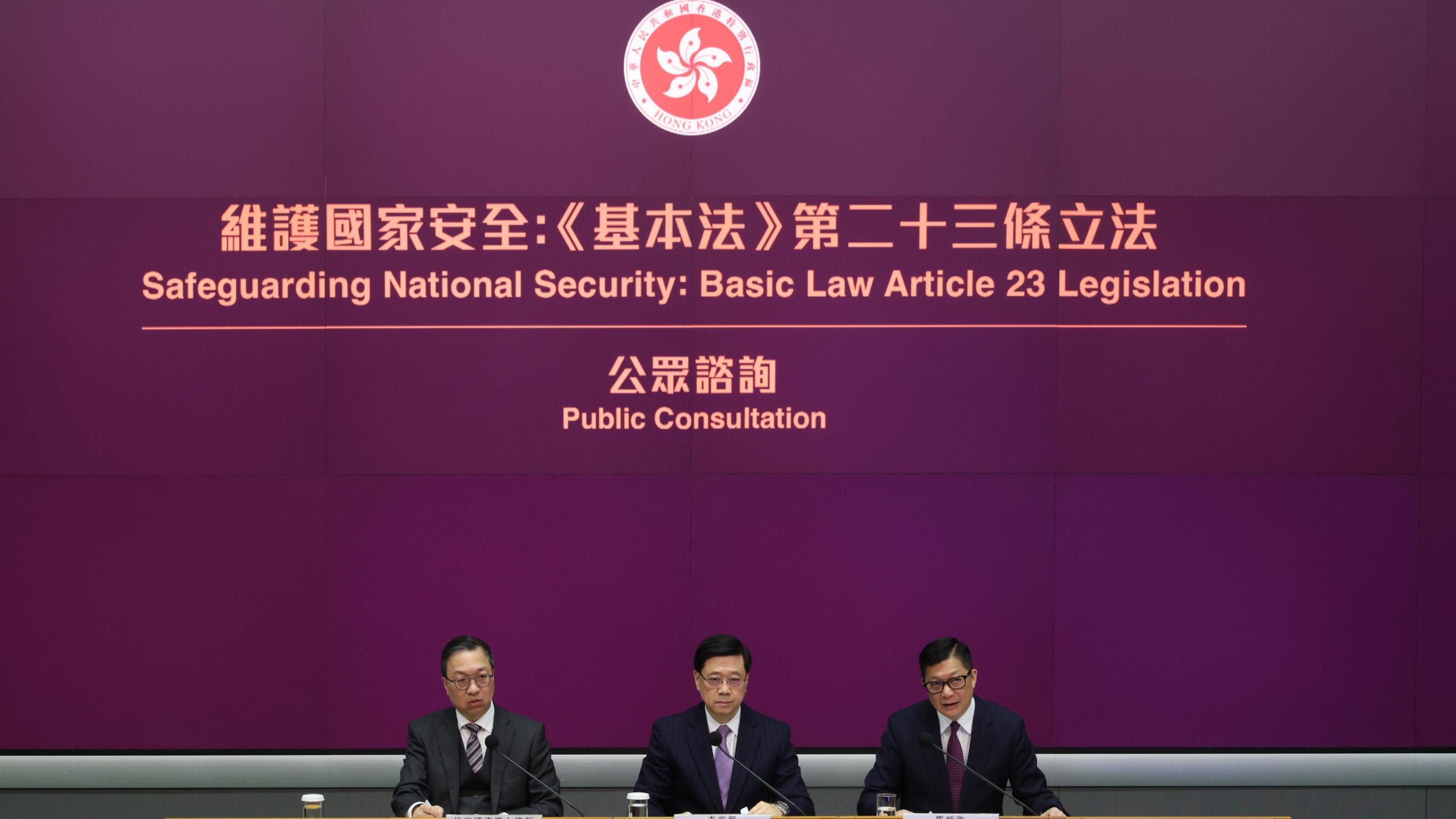 Hong Kong Chief Executive John Lee Ka-chiu (center), Secretary for Justice Paul Lam Ting-kwok (left), and Secretary for Security Chris Tang Ping-keung hold a press conference on the start of a public consultation on the legislation of Article 23 of the Basic Law at the Central Government Offices on Jan 30, 2024. (CALVIN NG / CHINA DAILY)
Hong Kong Chief Executive John Lee Ka-chiu (center), Secretary for Justice Paul Lam Ting-kwok (left), and Secretary for Security Chris Tang Ping-keung hold a press conference on the start of a public consultation on the legislation of Article 23 of the Basic Law at the Central Government Offices on Jan 30, 2024. (CALVIN NG / CHINA DAILY)
The Hong Kong Special Administration Region government has pledged to accelerate the legislation of Article 23 of the Basic Law, citing a strong consensus on the need for legislation voiced during the monthlong public consultation, which concluded on Wednesday.
Chief Executive John Lee Ka-chiu told reporters on Wednesday that most of the opinions received support the legislation.
The Security Bureau, which issued the consultation paper, will analyze and summarize the collected views and report to the Legislative Council for follow-up, he said.
Over the past month, various groups and individuals, including the Law Society of Hong Kong and the Hong Kong Bar Association, submitted their opinions on the proposed new ordinance, which aims to deter and punish crimes that threaten national security, as required by the Article 23 of the Basic Law.
Secretary for Justice Paul Lam Ting-kwok said the government is actively sorting through and analyzing the opinions and advice collected over the past month and will ensure that the legal provisions in the proposed ordinance will be detailed and clearly written
On Tuesday, Secretary for Justice Paul Lam Ting-kwok said his department will expedite the drafting of the legislation based on public opinions.
Speaking at the first meeting of a Legislative Council subcommittee on the matter, Lam said the Hong Kong community had reached a consensus on completing the legislation as soon as possible.
“This is not only the fulfillment of a constitutional responsibility that has been delayed for nearly 27 years, but also a prerequisite for the full focus of our development,” he said.
He said that the proposed ordinance will adopt drafting practices commonly used under the common law system in Hong Kong, ensuring “detailed and clear” legal provisions.
For example, regarding the offense of “theft of State secrets”, Lam said the proposed ordinance will set out what conduct, circumstances and intent constitutes such a crime, and whether there are exceptions or defenses as well as conditions that must be met to apply them.
If an offense has extraterritorial effects, the law will specify the object and scope of those effects, said Lam.
ALSO READ: Two sessions: Lee to reflect public opinion on Article 23 legislation
 A bus passes by commercial buildings in Central, Hong Kong, on Jan 8, 2024. (GARY CHIU / CHINA DAILY)
A bus passes by commercial buildings in Central, Hong Kong, on Jan 8, 2024. (GARY CHIU / CHINA DAILY)
As for penalties, Lam said the government wants the ordinance to follow the common law practice of prescribing a maximum penalty with sufficient deterrent effect, but not a minimum term of imprisonment.
Lam also said that the clauses in the draft ordinance would be written in accessible language, commonly used in local laws and in daily life, and the government will step up its efforts to explain the legislation to the community.
Lam also said that the clauses in the draft ordinance would be written in accessible language, commonly used in local laws and in daily life, and the government will step up its efforts to explain the legislation to the community
The Hong Kong government launched a public consultation on the legislation on Jan 30. Organizations and people from different sectors, including the Law Society of Hong Kong and the Hong Kong Bar Association, have been expressing their views on the legislation since then.
Gary Wong Chi-him, a board member of the Chinese Association of Hong Kong and Macao Studies, told China Daily that the consultation document for the planned legislation is more comprehensive than the document issued in 2003, and summarizes the Hong Kong government's past experiences in responding to national security threats.
Wong noted that the government has provided timely and clear explanations during the consultation period in response to any concerns raised by the public.
He said that discussions in the media and in professional fields concerning the legislation have been rational and have focused on practical issues with the provisions. Different sectors have also had many opportunities to voice their opinions and exchange views with officials. Anyone who was unable to attend the public exchange sessions can still learn about the legislation from the materials provided the government, he added.
READ MORE: Ip: Article 23 legislation to ensure a brighter future for HK
During the consultation period, there were few attempts to misinform or smear within the community, Wong said, adding that he believes the city will be able to complete national security legislation as soon as possible, and then the government can concentrate on improving economic development and people's livelihoods.



